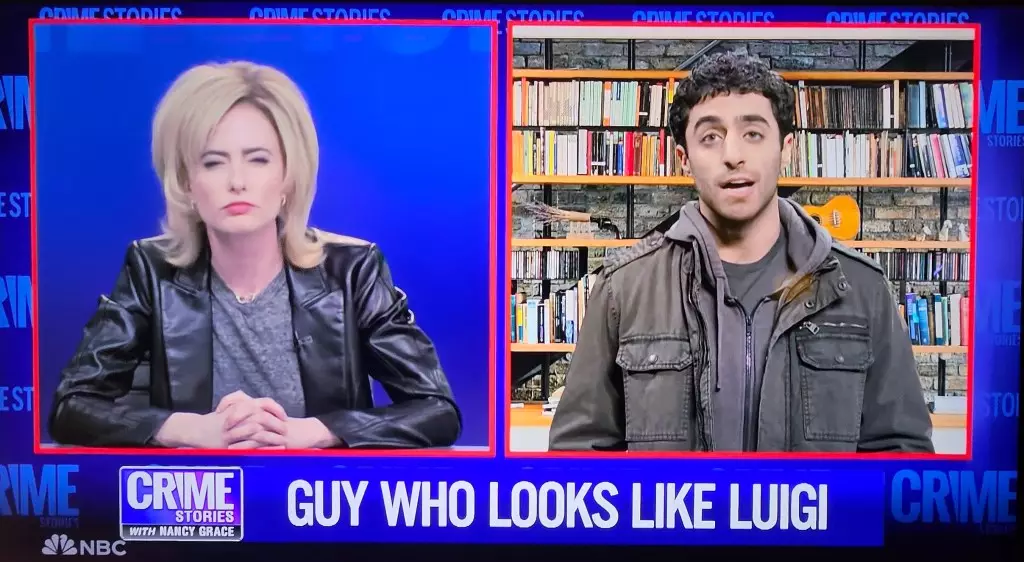In the vast realm of comedy, Saturday Night Live (SNL) has long stood as a hallmark of cultural satire, adept at blending humor with contemporary events. The recent cold open featuring Nancy Grace, portrayed by Sarah Sherman, serves as a pertinent example of how the iconic late-night show attempts to navigate current social commentary through humor. By tackling the sensational arrest of Luigi Mangione, dubbed the “healthcare assassin,” the skit reflects not only the peculiar zeitgeist surrounding popular culture but also the unique challenges comedians face in this changing landscape.
The cold open targeted the absurd celebrity status that some criminals acquire, a theme that is ever-present in today’s tabloid culture. Sherman’s portrayal of Grace was commendable, capturing the essence of her exaggerated persona and monologue style. The segment opened with a sharp critique of the public’s fascination with notorious figures—“Y’all, suckers made him a sex symbol!”—which encapsulates the panic and bewilderment when societal values seem to falter. Such a line resonates because it mirrors a widely held belief: that our culture often elevates the wrong icons to the status of superstardom.
However, the satire took a turn for the banal when it devolved into repetitive “sexy slayer” jokes that detracted from the underlying message. The biting punchlines lost their edge and turned formulaic, shifting from incisive commentary to recycled sexual innuendos. This shift not only diminished the satire’s potency but also illustrated a significant critique of SNL’s overreliance on familiar tropes when confronted with edgy material. Despite a strong setup, the execution ultimately undermined the intended satire, highlighting the risk of falling stagnant within a long-running series.
Moreover, audiences today are more discerning than ever. Viewers have access to a multitude of platforms for humor and commentary, which raises the stakes for SNL when creating relevant content. The sketch’s references to the digital age, especially the notion of YouTube videos interrupted by abrupt and loud ads, highlight a trend in comedy that both acknowledges and critiques the viewer experience. Unfortunately, the execution felt like a regurgitation of past skits rather than a fresh and innovative take. The commentary on our constant connectivity and the simultaneous era of high-profile crime and celebrity culture falls flat when layered with overly familiar comedic devices.
By drawing on the mantle of a comedy legend like Chris Rock as the host for this episode, SNL clearly aimed to harness some of that formidable comedic energy. Yet, despite his incredible talent, it’s unclear if the skit format adequately allowed for Rock’s comedic sensibility to shine. The open transitioned from impactful social commentary to a cascade of predictable responses spanning a spectrum from laughter to cringes.
As we witness the diminishing returns of routine comedic frameworks, it raises questions about the future trajectory of political satire. Traditional comedic formats, such as those laid out in SNL, may struggle to resonate with an audience constantly bombarded by unfiltered news and viral memes. The ebb and flow of cultural relevance require not just zealous critique but innovative approaches that push the envelope further into unpredictable territory.
With Martin Short scheduled to host the following week, SNL has a ripe opportunity to revisit its roots while simultaneously carving a groundbreaking path forward. The infusion of fresh energy and perspectives—especially when bringing in talent from various generations of comedy—could rejuvenate the show, ultimately enhancing its ability to reflect the zeitgeist rather than merely echoing it.
Saturday Night Live’s recent efforts, particularly the cold open featuring Nancy Grace, epitomize the struggles contemporary satire faces in maintaining relevance. The skit’s attempt to critique the cultural fascination with criminals through humor fell victim to overplayed tropes, calling into question the wider implications of such performances in a rapidly evolving comedic landscape. As audiences increasingly seek authenticity and originality, SNL must rise to the challenge by evolving its formats and approaches. It’s through this lens that the legacy of such an iconic series must be viewed—not as a relic, but as a living, breathing entity capable of navigating the complexities of modern satire.
